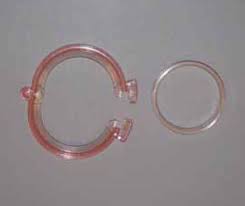Why Bill Gates Is Jazzed About This Male Circumcision Breakthrough
/
Convincing grown men to get circumcised can be a hard to sell (ouch!). But being circumcised dramatically lowers a man's risk of HIV infection, and so the Gates Foundation has been pushing circumcision for years now, launching a $50 million initiative back in 2009 to get more African men circumcised.
Now things are looking up for this effort thanks to new devices that have made it easier and less painful than ever for men to be circumcised.
The Gates Foundation is especially interested in the Shang Ring, a device invented in China for "minimally invasive male circumcision." The Shang Ring "consists of two concentric plastic rings that lock together over the foreskin, and is then removed and disposed of 7 days later,” according to one description. And its an advance over surgical circumcision because it doesn't require much training to use, and doesn't result in bleeding or other complications. In theory, a great many clinics, however remote, can use the Shang Ring —assuming they can find willing men!
You can see why this is the type of invention that gets somebody like Gates jazzed up. The Shang Ring is just a couple of pieces of plastic, costing next to nothing to make, yet it can saves lives and prevent immense suffering. As Gates wrote in his 2012 annual letter:
Funding for circumcision is finally being prioritized, since the cost is quite low and the protection is lifelong. Over 1 million men ages 15–49 have been circumcised in 14 Southern and Eastern African countries with large AIDS epidemics, but that is only 5 percent of the total number who could benefit from the procedure.
Gates mentioned the Shang Ring, along with the PrePex as devices that could greatly simplify the process of circumcising millions of men.
But questions remain about the Shang Ring, which is why the Gates Foundation is giving millions of dollars to Family Health International over a multi-year period to evaluate the device and how it is used. The latest Gates grant to FHI for this work just went out the door in December, for $2,595,152.
Still, even when the Shang Ring is readily available, the heavy lift will still be getting men to accept circumcision. It's expensive and time consuming to publicize and promote male circumcision. But Kenya is one country which has made a lot of progress on this front, which bodes well for other regions.
I'd imagine that the Gates Foundation will eventually roll out some very big money to encourage use of the Shang Ring.








